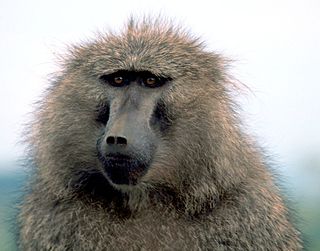
Evolutionary psychology is a theoretical approach in psychology that examines cognition and behavior from a modern evolutionary perspective. It seeks to identify human psychological adaptations with regards to the ancestral problems they evolved to solve. In this framework, psychological traits and mechanisms are either functional products of natural and sexual selection or non-adaptive by-products of other adaptive traits.

Sociobiology is a field of biology that aims to examine and explain social behavior in terms of evolution. It draws from disciplines including psychology, ethology, anthropology, evolution, zoology, archaeology, and population genetics. Within the study of human societies, sociobiology is closely allied to evolutionary anthropology, human behavioral ecology, evolutionary psychology, and sociology.

Primatology is the scientific study of primates. It is a diverse discipline at the boundary between mammalogy and anthropology, and researchers can be found in academic departments of anatomy, anthropology, biology, medicine, psychology, veterinary sciences and zoology, as well as in animal sanctuaries, biomedical research facilities, museums and zoos. Primatologists study both living and extinct primates in their natural habitats and in laboratories by conducting field studies and experiments in order to understand aspects of their evolution and behavior.
Michael Tomasello is an American developmental and comparative psychologist, as well as a linguist. He is professor of psychology at Duke University.

Richard Walter Wrangham is an English anthropologist and primatologist; he is Professor of Biological Anthropology at Harvard University. His research and writing have involved ape behavior, human evolution, violence, and cooking.

Geoffrey Franklin Miller is an American evolutionary psychologist, author, and associate professor of psychology at the University of New Mexico. He is known for his research on sexual selection in human evolution.

Donald Thomas Campbell was an American social scientist. He is noted for his work in methodology. He coined the term evolutionary epistemology and developed a selectionist theory of human creativity. A Review of General Psychology survey, published in 2002, ranked Campbell as the 33rd most cited psychologist of the 20th century.
Dual inheritance theory (DIT), also known as gene–culture coevolution or biocultural evolution, was developed in the 1960s through early 1980s to explain how human behavior is a product of two different and interacting evolutionary processes: genetic evolution and cultural evolution. Genes and culture continually interact in a feedback loop, changes in genes can lead to changes in culture which can then influence genetic selection, and vice versa. One of the theory's central claims is that culture evolves partly through a Darwinian selection process, which dual inheritance theorists often describe by analogy to genetic evolution.

Evolutionary developmental psychology (EDP) is a research paradigm that applies the basic principles of evolution by natural selection, to understand the development of human behavior and cognition. It involves the study of both the genetic and environmental mechanisms that underlie the development of social and cognitive competencies, as well as the epigenetic processes that adapt these competencies to local conditions.
Darwinian literary studies is a branch of literary criticism that studies literature in the context of evolution by means of natural selection, including gene-culture coevolution. It represents an emerging trend of neo-Darwinian thought in intellectual disciplines beyond those traditionally considered as evolutionary biology: evolutionary psychology, evolutionary anthropology, behavioral ecology, evolutionary developmental psychology, cognitive psychology, affective neuroscience, behavioural genetics, evolutionary epistemology, and other such disciplines.
Biocultural anthropology can be defined in numerous ways. It is the scientific exploration of the relationships between human biology and culture. "Instead of looking for the underlying biological roots of human behavior, biocultural anthropology attempts to understand how culture affects our biological capacities and limitations."
Cognitive science of religion is the study of religious thought, theory, and behavior from the perspective of the cognitive and evolutionary sciences. Scholars in this field seek to explain how human minds acquire, generate, and transmit religious thoughts, practices, and schemas by means of ordinary cognitive capacities.
The evolutionary psychology of religion is the study of religious belief using evolutionary psychology principles. It is one approach to the psychology of religion. As with all other organs and organ functions, the brain's functional structure is argued to have a genetic basis, and is therefore subject to the effects of natural selection and evolution. Evolutionary psychologists seek to understand cognitive processes, religion in this case, by understanding the survival and reproductive functions they might serve.
Cultural group selection is an explanatory model within cultural evolution of how cultural traits evolve according to the competitive advantage they bestow upon a group. This multidisciplinary approach to the question of human culture engages research from the fields of anthropology, behavioural economics, evolutionary biology, evolutionary game theory, sociology, and psychology.
Robert Turner Boyd is an American anthropologist. He is professor of the School of Human Evolution and Social Change (SHESC) at Arizona State University (ASU). His research interests include evolutionary psychology and in particular the evolutionary roots of culture. Together with his primatologist wife, Joan B. Silk, he wrote the textbook How Humans Evolved.
Cognitive ecology of religion is an integrative approach to studying how religious beliefs covary with social and natural dynamics of the environment. This is done by incorporating a cognitive ecological perspective to cross-cultural god concepts. Religious beliefs are thought to be a byproduct of domain-specific cognitive modules that give rise to religious cognition. The cognitive biases leading to religious belief are constraints on perceptions of the environment, which is part and parcel of a cognitive ecological approach. This means that they not only shape religious beliefs, but they are determinants of how successfully cultural beliefs are transmitted.
Evolutionary psychology has traditionally focused on individual-level behaviors, determined by species-typical psychological adaptations. Considerable work, though, has been done on how these adaptations shape and, ultimately govern, culture. Tooby and Cosmides (1989) argued that the mind consists of many domain-specific psychological adaptations, some of which may constrain what cultural material is learned or taught. As opposed to a domain-general cultural acquisition program, where an individual passively receives culturally-transmitted material from the group, Tooby and Cosmides (1989), among others, argue that: "the psyche evolved to generate adaptive rather than repetitive behavior, and hence critically analyzes the behavior of those surrounding it in highly structured and patterned ways, to be used as a rich source of information out of which to construct a 'private culture' or individually tailored adaptive system; in consequence, this system may or may not mirror the behavior of others in any given respect.".
Cultural evolution is an evolutionary theory of social change. It follows from the definition of culture as "information capable of affecting individuals' behavior that they acquire from other members of their species through teaching, imitation and other forms of social transmission". Cultural evolution is the change of this information over time.
Richard McElreath is an American professor of anthropology and a director of the Max Planck Institute for Evolutionary Anthropology in Leipzig, Germany. He's an author of the Statistical Rethinking applied Bayesian statistics textbook, among the first to largely rely on the Stan statistical environment, and the accompanying rethinking R language package.

The WEIRDest People in the World: How the West Became Psychologically Peculiar and Particularly Prosperous is a 2020 book by Harvard professor Joseph Henrich that aims to explain history and psychological variation with approaches from cultural evolution and evolutionary psychology. In the book, Henrich explores how institutions and psychology jointly influence each other over time. More specifically, he argues that a series of Catholic Church edicts on marriage that began in the 4th century undermined the foundations of kin-based society and created the more analytical, individualistic thinking prevalent in western societies.







